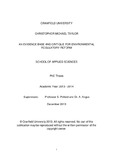JavaScript is disabled for your browser. Some features of this site may not work without it.
| dc.contributor.advisor | Pollard, Simon | |
| dc.contributor.advisor | Angus, Andrew | |
| dc.contributor.author | Taylor, Christopher Michael | |
| dc.date.accessioned | 2014-05-20T09:16:29Z | |
| dc.date.available | 2014-05-20T09:16:29Z | |
| dc.date.issued | 2013-12 | |
| dc.identifier.uri | http://dspace.lib.cranfield.ac.uk/handle/1826/8455 | |
| dc.identifier.uri | https://doi.org/10.17862/cranfield.rd.6834542.v1 | |
| dc.description.abstract | Societies have established various forms of governance to protect the natural environment from the adverse effects of human activity. While direct “command and control” regulation has achieved significant improvements in environmental protection, concerns for its efficiency have led governments to seek alternative approaches to achieve environmental policy objectives. Commentators describe a shift from “government” to “governance” as policy makers and regulators seek to harness wider social forces beyond government, while risk-based regulation is pursued to target constrained regulatory resources for maximum effect. However, robust evidence for the effectiveness of different forms of regulation is lacking. This thesis addresses this gap, providing an evidence base for instrument selection and a data-informed critique of regulatory reform practice. Research followed a case study strategy, gathering qualitative data through 58 in-depth semi-structured interviews, analysed using the NVIVO™ Computer Aided Qualitative Data Analysis System (CAQDAS), with senior policy makers at the Department for Environment, Food and Rural Affairs, England (Defra) and senior executives in businesses and trade associations in 5 UK sectors. (1) A new typology of regulatory instruments has been compiled, validated with sector experts, refined for policy end-users, and published as part of Defra’s guidance on instrument selection. (2) The critical case of instrument selection in practice at Defra has been examined for the first time, revealing factors affecting choice, the use of coregulation to develop evidence and the importance of retaining policy maker skills for new forms of regulation. (3) A multiple-case study of senior business representatives found five strongly preferred voluntary regulation, seven expressed significant doubts about its effectiveness, and 19 expressed no general preference. While voluntary approaches were valued for flexibility and lower burdens, direct regulation offered stability and a level playing field. They sought inter alia coherent, evidence based regulatory frameworks, delivered through positive regulatory relationships. This research progresses the better and smarter regulation debate on the use of alternatives to direct regulation and has already been used to inform policy making in practice. | en_UK |
| dc.description.sponsorship | Defra | |
| dc.language.iso | en | en_UK |
| dc.publisher | Cranfield University | en_UK |
| dc.rights | © Cranfield University 2013. All rights reserved. No part of this publication may be reproduced without the written permission of the copyright owner. | en_UK |
| dc.subject | Environmental policy | en_UK |
| dc.subject | Regulation | en_UK |
| dc.subject | Regulatory reform | en_UK |
| dc.title | An evidence base and critique for environmental regulatory reform | en_UK |
| dc.type | Thesis or dissertation | en_UK |
| dc.type.qualificationlevel | Doctoral | en_UK |
| dc.type.qualificationname | PhD | en_UK |
| dc.identifier.grantnumber | BR0101 | |
| dc.identifier.doi | 10.17862/cranfield.rd.6834542.v1 |
